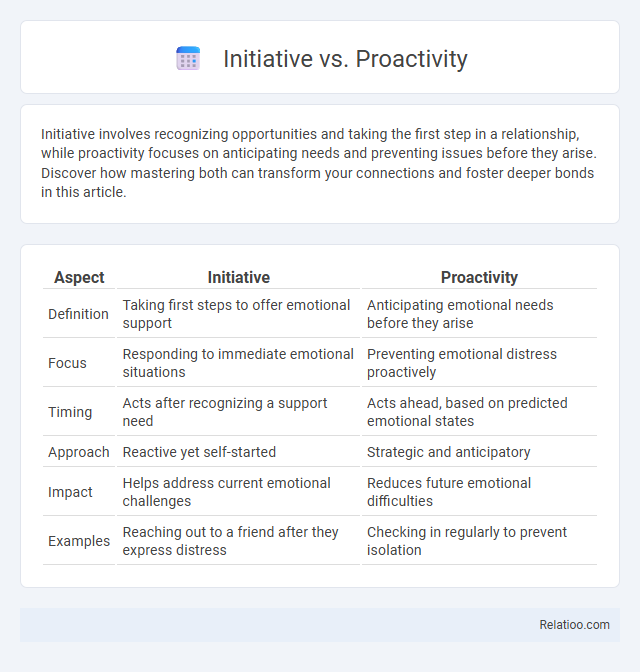Initiative involves recognizing opportunities and taking the first step in a relationship, while proactivity focuses on anticipating needs and preventing issues before they arise. Discover how mastering both can transform your connections and foster deeper bonds in this article.
Table of Comparison
| Aspect | Initiative | Proactivity |
|---|---|---|
| Definition | Taking first steps to offer emotional support | Anticipating emotional needs before they arise |
| Focus | Responding to immediate emotional situations | Preventing emotional distress proactively |
| Timing | Acts after recognizing a support need | Acts ahead, based on predicted emotional states |
| Approach | Reactive yet self-started | Strategic and anticipatory |
| Impact | Helps address current emotional challenges | Reduces future emotional difficulties |
| Examples | Reaching out to a friend after they express distress | Checking in regularly to prevent isolation |
Understanding Initiative and Proactivity: Key Definitions
Understanding initiative involves recognizing the ability to independently start tasks or projects without being prompted, while proactivity emphasizes anticipating future challenges and taking early action to address them. Initiative drives your willingness to act, whereas proactivity enhances strategic planning by focusing on prevention and foresight. Together, initiative and proactivity empower your leadership and problem-solving skills by combining immediate action with forward-thinking.
Core Differences Between Initiative and Proactivity
Initiative involves taking the first step to start a task or project without being asked, whereas proactivity includes anticipating future challenges and acting in advance to address them. The core difference lies in timing and foresight: initiative is about immediate action, and proactivity encompasses planning and prevention. Your ability to distinguish these behaviors enhances leadership effectiveness and personal productivity.
The Importance of Initiative in Personal Development
Taking initiative is a crucial driver of personal development because it empowers you to identify opportunities and act without waiting for external prompts, fostering growth and self-improvement. Proactivity builds on initiative by anticipating future challenges and creating strategies to address them, enhancing your ability to manage change effectively. Your commitment to showing initiative cultivates confidence, resilience, and a proactive mindset essential for achieving long-term personal and professional goals.
How Proactivity Drives Long-Term Success
Proactivity drives long-term success by enabling individuals and organizations to anticipate challenges, seize opportunities, and implement strategic plans before issues arise. Unlike simple initiative, which involves taking action, proactivity encompasses a forward-thinking mindset that prioritizes prevention and continuous improvement. This approach fosters resilience, adaptability, and sustained growth in dynamic environments.
Examples of Initiative in the Workplace
Taking initiative in the workplace involves identifying opportunities or problems and acting without waiting for direction, such as suggesting improvements to a project workflow or volunteering to lead a task force. Proactivity goes beyond initiative by anticipating future challenges and addressing them ahead of time, like preparing contingency plans before issues arise. You demonstrate initiative by stepping up to streamline communication channels or introducing innovative tools that boost team productivity.
Proactive Behavior: Anticipating and Preventing Problems
Proactive behavior involves anticipating potential problems and implementing preventive measures to avoid disruptions, which enhances organizational resilience and efficiency. Unlike simple initiative that focuses on taking action first, proactivity requires forward-thinking, risk assessment, and strategic planning to address issues before they escalate. Research shows that teams practicing proactive behavior experience 30% fewer crises and improved long-term performance compared to those relying solely on reactive responses.
Initiative vs Proactivity: Which Matters More?
Initiative involves taking the first step without being prompted, while proactivity entails anticipating future needs and acting in advance to address them. Your success relies more on proactivity because it demonstrates foresight and strategic action that prevent problems before they arise. Embracing proactivity over merely showing initiative can set you apart in complex and dynamic environments.
Cultivating Initiative: Practical Steps
Cultivating initiative requires recognizing opportunities and acting decisively without waiting for external prompts, which builds your ability to lead and innovate consistently. Practical steps include setting clear personal goals, seeking feedback to refine your approach, and embracing challenges that stretch your skills and confidence. Developing these habits enhances proactive behavior and ensures your continual growth in dynamic environments.
Building a Proactive Mindset: Strategies for Growth
Building a proactive mindset involves taking initiative by anticipating challenges and acting before problems arise, which differentiates from simply responding to situations. You can develop this growth-oriented mindset by setting clear goals, seeking feedback proactively, and embracing continuous learning to adapt and innovate. Cultivating strategic foresight and self-discipline empowers ongoing personal and professional development through proactive decision-making.
Integrating Initiative and Proactivity for Maximum Impact
Integrating initiative and proactivity enhances your ability to anticipate challenges and drive continuous improvement by combining the willingness to act with forward-thinking strategies. This synergy empowers you to take ownership of tasks while strategically planning for future opportunities, maximizing efficiency and innovation. Fostering both qualities cultivates a dynamic approach that accelerates personal and organizational success.

Infographic: Initiative vs Proactivity
 relatioo.com
relatioo.com